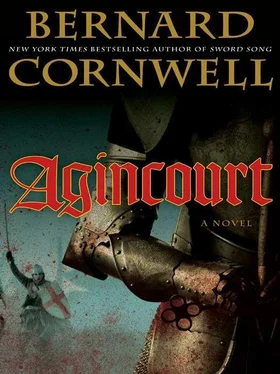“Here’s Sir Martin,” Snoball said, as if his companions would not recognize the priest who, as he drew nearer, grinned. Hook felt a tremor of hatred as he saw the eel-thin Sir Martin with his loping stride, lopsided face, and his strange, intense eyes that some thought looked beyond this world to the next, though opinion varied whether Sir Martin gazed at hell or heaven. Hook’s grandmother had no doubts. “He was bitten by the devil’s dog,” she liked to say, “and if he hadn’t been born gentry he’d have been hanged by now.”
The archers stood with grudging respect as the priest drew near. “God’s work waits on you, boys,” Sir Martin greeted them. His dark hair was gray at the sides and thin on top. He had not shaved for some days and his long chin was covered in white stubble that reminded Hook of frost. “We need a ladder,” Sir Martin said, “and Sir Edward’s bringing the ropes. Nice to see the gentry working, isn’t it? We need a long ladder. There has to be one somewhere.”
“A ladder,” Will Snoball said, as if he had never heard of such a thing.
“A long one,” Sir Martin said, “long enough to reach that beam.” He jerked his head at the sign of the bull over their heads. “Long, long.” He said the last words distractedly, as if he were already forgetting what business he was about.
“Look for a ladder,” Will Snoball told two of the archers, “a long one.”
“No short ladders for God’s work,” Sir Martin said, snapping his attention back to the archers. He rubbed his thin hands together and grimaced at Hook. “You look ill, Hook,” he added happily, as if hoping Nick Hook were dying.
“The ale tastes funny,” Hook said.
“That’s because it’s Friday,” the priest said, “and you should abstain from ale on Wednesdays and Fridays. Your name-saint, the blessed Nicholas, rejected his mother’s teats on Wednesdays and Fridays, and there’s a lesson in that! There can be no pleasures for you, Hook, on Wednesdays and Fridays. No ale, no joy, and no tits, that is your fate forever. And why, Hook, why?” Sir Martin paused and his long face twisted in a malevolent grin. “Because you have supped on the sagging tits of evil! I will not have mercy on her children, the scriptures say, because their mother hath played the harlot!”
Tom Perrill sniggered. “What are we doing, father?” Will Snoball asked tiredly.
“God’s work, Master Snoball, God’s holy work. Go to it.”
A ladder was found as Sir Edward Derwent crossed the market square with four ropes looped about his broad shoulders. Sir Edward was a man-at-arms and wore the same livery as the archers, though his jupon was cleaner and its colors were brighter. He was a squat, thick-chested man with a face disfigured at the battle of Shrewsbury where a poleax had ripped open his helmet, crushed a cheekbone and sliced off an ear. “Bell ropes,” he explained, tossing the heavy coils onto the ground. “Need them tied to the beam, and I’m not climbing any ladder.” Sir Edward commanded Lord Slayton’s men-at-arms and he was as respected as he was feared. “Hook, you do it,” Sir Edward ordered.
Hook climbed the ladder and tied the bell ropes to the beam. He used the knot with which he would have looped a hempen cord about a bowstave’s nock, though the ropes, being thicker, were much harder to manipulate. When he was done he shinned down the last rope to show that it was tied securely.
“Let’s get this done and over,” Sir Edward said sourly, “and then maybe we can leave this goddamned place. Whose ale is this?”
“Mine, Sir Edward,” Robert Perrill said.
“Mine now,” Sir Edward said, and drained the pot. He was dressed in a mail coat over a leather jerkin, all of it covered with the starry jupon. A sword hung at his waist. There was nothing elaborate about the weapon. The blade, Hook knew, was undecorated, the hilt was plain steel, and the handle was two grips of walnut bolted to the tang. The sword was a tool of Sir Edward’s trade, and he had used it to batter down the rebel whose poleax had taken half his face.
The small crowd had been herded by soldiers and priests into the center of the marketplace where most of them knelt and prayed. There were maybe sixty of them, men and women, young and old. “Can’t burn them all,” Sir Martin said regretfully, “so we’re sending most to hell at the rope’s end.”
“If they’re heretics,” Sir Edward grumbled, “they should all be burned.”
“If God wished that,” Sir Martin said with some asperity, “then God would have provided sufficient firewood.”
More people were appearing now. Fear still pervaded the city, but folk somehow sensed that the greatest moment of danger was over, and so they came to the marketplace and Sir Martin ordered the archers to let them pass. “They should see this for themselves,” the priest explained. There was a sullenness in the gathering crowd, their sympathies plainly aligned with the prisoners and not the guards, though here and there a priest or friar preached an extemporary sermon to justify the day’s events. The doomed, the preachers explained, were enemies of Christ. They were weeds among the righteous wheat. They had been given a chance to repent, but had refused that mercy and so must face their eternal fate.
“Who are they anyway?” Hook asked.
“Lollards,” Sir Edward said.
“What’s a Lollard?”
“A heretic, you piece of slime,” Snoball said happily, “and the bastards were supposed to gather here and start a rebellion against our gracious king, but instead they’re going to hell.”
“They don’t look like rebels,” Hook said. Most of the prisoners were middle-aged, some were old, while a handful was very young. There were women and girls among them.
“Doesn’t matter what they look like,” Snoball said, “they’re heretics and they have to die.”
“It’s God’s will,” Sir Martin snarled.
“But what makes them heretics?” Hook asked.
“Oh, we are curious today,” Sir Martin said sourly.
“I’d like to know that too,” Michael said.
“Because the church says they’re heretics,” Sir Martin snapped, then appeared to relent of his tone. “Do you believe, Michael Hook, that when I raise the host it turns into the most holy and beloved and mystical flesh of our Lord Jesus Christ?”
“Yes, father, of course!”
“Well, they don’t believe that,” the priest said, jerking his head at the Lollards kneeling in the mud, “they believe the bread stays bread, which makes them turds-for-brains piss-shits. And do you believe that our blessed father the Pope is God’s vicar on earth?”
“Yes, father,” Michael said.
“Thank Christ for that, or else I’d have to burn you.”
“I thought there were two popes?” Snoball put in.
Sir Martin ignored that. “Ever seen a sinner burn, Michael Hook?” he asked.
“No, father.”
Sir Martin grinned lasciviously. “They scream, young Hook, like a boar being gelded. They do scream so!” He turned suddenly and thrust a long bony finger into Nick Hook’s chest. “And you should listen to those screams, Nicholas Hook, for they are the liturgy of hell. And you,” he prodded Hook’s chest again, “are hell-bound.” The priest whirled around, arms suddenly outspread, so that he reminded Hook of a great dark-winged bird. “Avoid hell, boys!” he called enthusiastically, “avoid it! No tits on Wednesdays and Fridays, and do God’s work diligently every day!”
More ropes had been slung from other signposts about the marketplace, and now soldiers roughly divided the prisoners into groups that were pushed toward the makeshift gallows. One man began shouting to his friends, telling them to have faith in God and that they would all meet in heaven before this day was over, and he went on shouting till a soldier in royal livery broke his jaw with a mail-shod fist. The broken-jawed man was one of the two selected for the fires and Hook, standing apart from his comrades, watched as the man was hoisted onto the stone-and gravel-filled barrel and tied to the stake. More firewood was piled around his feet.
Читать дальше












